人教版(2019)必修第二册Unit 4 History and Traditions Listening and Speaking 课件(共35张PPT)
文档属性
| 名称 | 人教版(2019)必修第二册Unit 4 History and Traditions Listening and Speaking 课件(共35张PPT) | 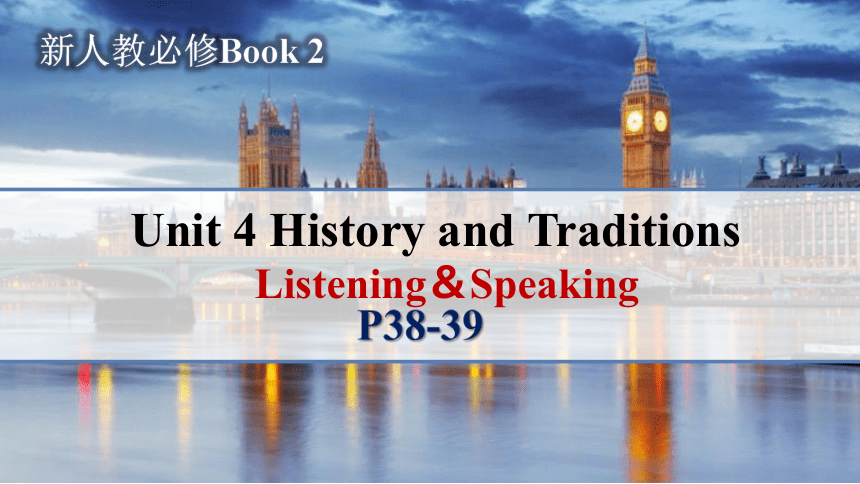 | |
| 格式 | pptx | ||
| 文件大小 | 7.6MB | ||
| 资源类型 | 教案 | ||
| 版本资源 | 人教版(2019) | ||
| 科目 | 英语 | ||
| 更新时间 | 2024-04-04 10:27:40 | ||
图片预览


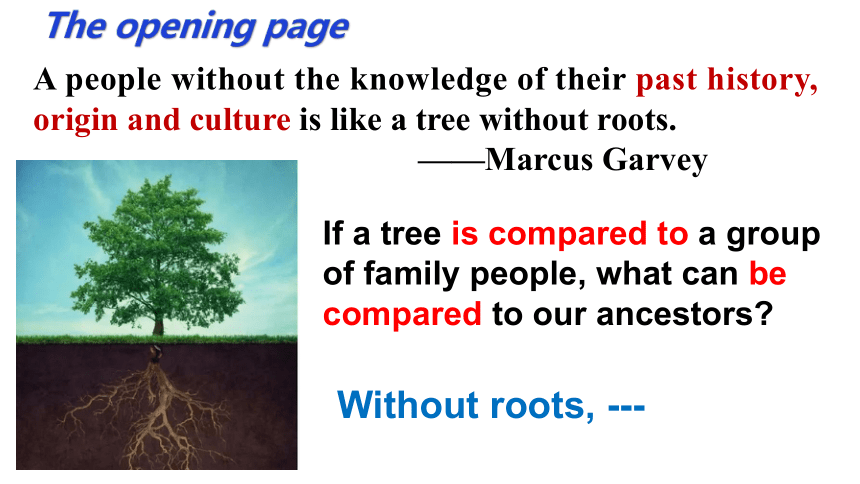
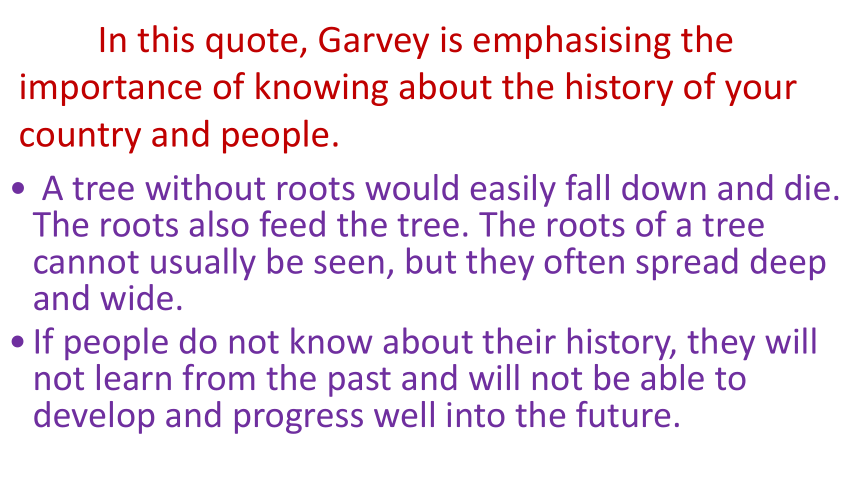

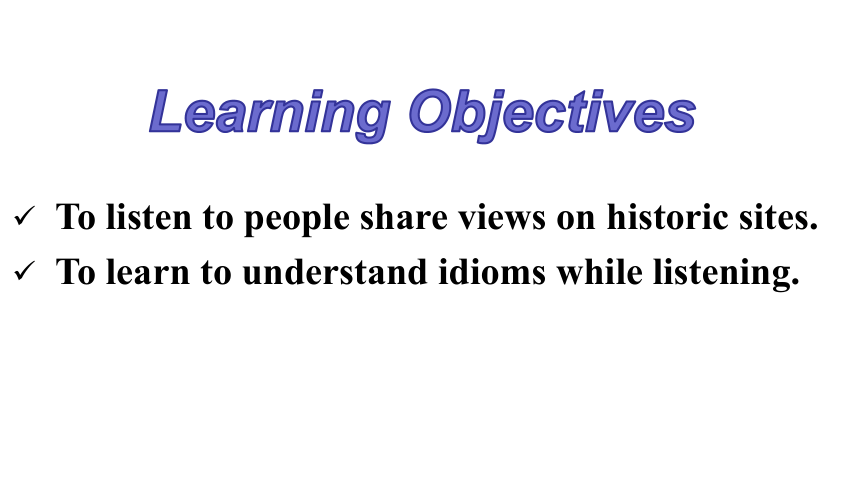
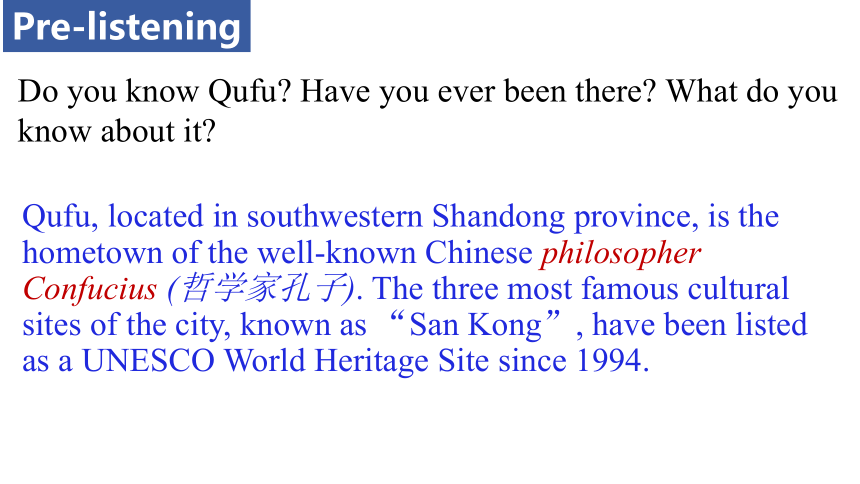
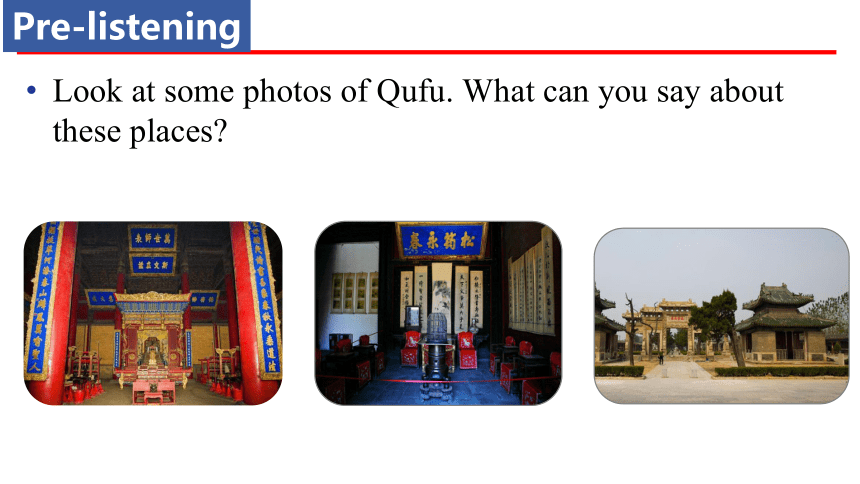
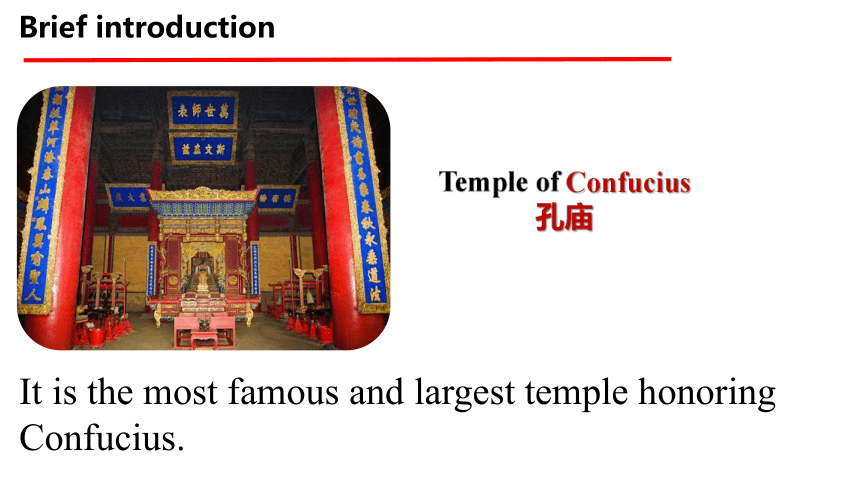
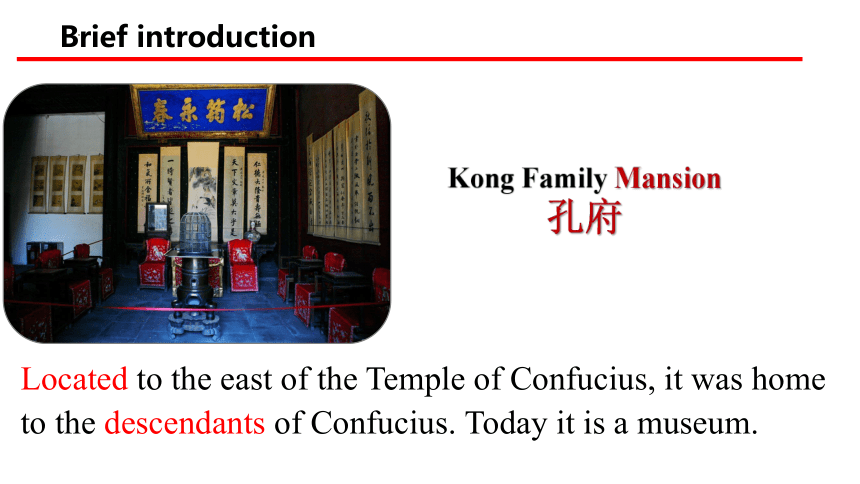
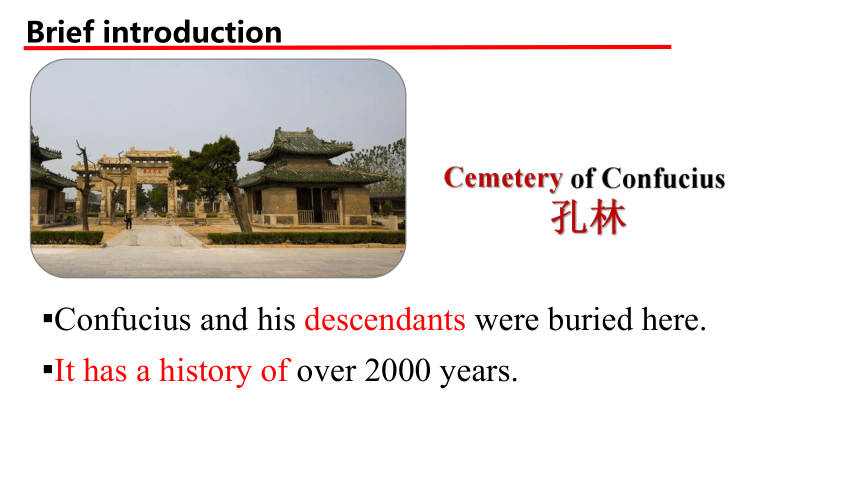
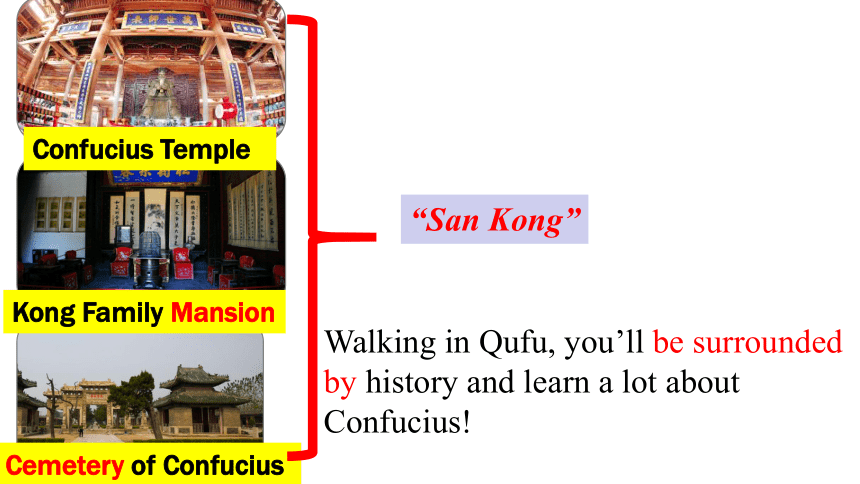
文档简介
(共35张PPT)
新人教必修Book 2
Listening&Speaking
P38-39
Unit 4 History and Traditions
The opening page
A people without the knowledge of their past history, origin and culture is like a tree without roots.
——Marcus Garvey
The opening page
If a tree is compared to a group of family people, what can be compared to our ancestors
Without roots, ---
In this quote, Garvey is emphasising the importance of knowing about the history of your country and people.
A tree without roots would easily fall down and die. The roots also feed the tree. The roots of a tree cannot usually be seen, but they often spread deep and wide.
If people do not know about their history, they will not learn from the past and will not be able to develop and progress well into the future.
Listening&Speaking P38-39
Share views on historic sites
To listen to people share views on historic sites.
To learn to understand idioms while listening.
Learning Objectives
Do you know Qufu Have you ever been there What do you know about it
Pre-listening
Qufu, located in southwestern Shandong province, is the hometown of the well-known Chinese philosopher Confucius (哲学家孔子). The three most famous cultural sites of the city, known as “San Kong”, have been listed as a UNESCO World Heritage Site since 1994.
Look at some photos of Qufu. What can you say about these places
Pre-listening
Brief introduction
Temple of Confucius
孔庙
It is the most famous and largest temple honoring Confucius.
Brief introduction
Kong Family Mansion
孔府
Located to the east of the Temple of Confucius, it was home to the descendants of Confucius. Today it is a museum.
Brief introduction
Confucius and his descendants were buried here.
It has a history of over 2000 years.
Cemetery of Confucius
孔林
“San Kong”
Confucius Temple
Kong Family Mansion
Cemetery of Confucius
Walking in Qufu, you’ll be surrounded by history and learn a lot about Confucius!
Listen to the conversation between a British tourist and a Chinese student in Qufu.
William
Xiao Kong
While-listening
Activity1: Look at the table on page 38 and predict what the conversation mainly about.
Listen to the conversation and check your prediction.
Fact/Opinion about Confucius
William
Xiao Kong
A British tourist and a Chinese student in Qufu share their views on Confucius and the historic sites of Qufu.
Activity2: Listen to the conversation again and write down what they say about Confucius.
Fact/Opinion about Confucius
William 1. Confucius is one of__________________________.
Xiao Kong
2. He was a ______ man .
3. He lived ________________ago.
3. He was ________________________in history.
2. He was a great ______and had many ideas about_______.
1. Confucius has _____________descendants.
wise
over 2000 years
his favorite philosophers
over 3 million
educator
one of the greatest minds
education
Tip: Fact or Opinion
Activity3: Use the facts and opinions below to share your views on Confucius .
Linking words Fact/Opinion about Confucius
As far as I'm concerned, I think that... be considered as... 1. Confucius is one of__________________________.
2. He was a ______ man .
3. He lived ________________ago.
3. He was ________________________in history.
2. He was a great ______and had many ideas about_______.
1. Confucius has _____________descendants.
wise
over 2000 years
his favorite philosophers
over 3 million
educator
one of the greatest minds
education
Listen again then decide whether statements below are true(T) or false(F)or not mentioned (NM). Then answer the questions.
1. Confucius said that learning without understanding leads to confusion. ___
2. Xiao Kong is doing a research project on Confucius philosophy. ___
3. As one of Confucius' descendants, Xiao Kong's name is recorded in the family tree. ___
4. Dacheng Hall is the tallest building in Qufu. ___
F
F
NM
T
reflecting
学而不思则罔
Confucius’ ideas on education
Activity 4:
Why do you think William said his hometown was similar to Qufu
There are famous halls in his hometown.
There are no tall buildings in his hometown.
Both places have a famous person who was born there.
His hometown doesn’t allow other buildings to be more noticeable than the historic buildings.
W: Oh, great! What’s that big building over there
X: Oh, that’s the famous Dacheng Hall. You know, it’s so well-respected in Qufu that no other building in the city can be taller than it.
W:Oh, that’s respect. That’s a little bit like my hometown– Stratford-upon-Avon.
William: Excuse me, do you speak English I’m looking for the
Confucius Temple, but I’m not good at _______ they’re my Achilles’ heel!
Xiao Kong: Oh, hello, e with me—I’m going to the temple right
now. By the way, what does “Achilles’ heel” mean
William: Oh, it means that something is my ________ I’m really bad with
maps! So do you know much about Confucius He’s one of my _________
philosophers. He was such a _______ man.
Xiao Kong: Oh, yes. I was born here. In fact, I believe I am a descendant
of Confucius himself.
William: No way, you’re pulling my leg, right So how do you know
you’re related to Confucius Didn’t he live over ________ years ago
maps
weakness
favorite
2500
wise
Activity 5: Read with the tape.
Xiao Kong: Yes, but his family tree is well recorded. He has over _______
million descendants. Sorry again, what does “pulling my leg” mean
William: Oh, sorry, it means to _____ with someone. Anyway, so you’re
actually going to the _______ to pay respect to your relative
Xiao Kong: Well, yes. But I’m also meeting my study group there. We are
doing a research project on Confucius ideas on education. You know,
Confucius was great _________, and he had many great ideas about
education. For example, he talked about the relationship between learning
and ________. He believed that learning without reflecting leads to
confusion ... Oh, look, the temple is just over there.
William: Oh, great! What’s that big building over there
Xiao Kong: Oh, that’s the famous Dacheng Hall. You know, it’s so well
respected in Qufu that no other building in the city can be ______ than it.
reflecting
three
temple
educator
joke
taller
William: Wow, now that’s respect. That’s a little bit like my hometown—
Stratford-upon-Avon.
Xiao Kong: Wait, you mean ______ Shakespeare was from What a
coincidence — Confucius and Shakespeare, two of the greatest minds in
history! I really want to visit the UK I’m really interested in _______ history
and culture.
William: Oh, that’s great! So later we can go for a cup of ____ and have a
chat about it. And it would be great if you could take me somewhere to get
my watch fixed.
Xiao Kong: OK, no problem! So come and meet my study group—we can
tell you all about the temple. And _________are you staying in Qufu I can
show you the Cemetery of Confucius and the Kong Family Mansion as well...
William: Really That’s so kind! I need all the help I can get. —I’m like a fish
out of water !
where
British
tea
how long
Understanding idioms
An idiom is an expression which means something different from the meaning of the individual words. Some idioms present an idea or paint a picture that gives a hint as to the meaning. Other idioms can only be understood from the context in which they appear.
English idiom Meaning Chinese equivalent
Achilles’ heel
pull one’s leg
fish out of water
Write down the English idioms that are used in the conversation. Explain their meanings and think about some of Chinese equivalents.
sth. that is sb’s weakness
to joke with sb.
sb. who feels uncomfortable because they are in an unfamiliar place
弱点;要害
戏弄
如芒在背
Activity 6:
Understanding idioms
Understanding the meaning of idioms and popular sayings in English is a good way to understand the culture of English-speaking countries.
Learning idioms can help us with listening to native speakers and help with natural speaking and fluency.
Summary
Tip: Use idioms.
Confucius
What do you know about his ideas on education
Post-listening
Review the old and learn the new.
Learning without reflecting leads to confusion.
To learn and at due(adj.适当的) time to repeat what one has learnt, isn’t that after all a pleasure
Make no social distinctions in teaching.
温故而知新
有教无类
学而时习之,不亦乐乎?
学而不思则罔
Post-listening
Gropu work: Write a passage to introduce Qufu according to what we have learnt in today's class.
Requriements:
1.Your introduction may include at least 2 aspacts and one of Confucius’ ideas on education.
2.You should point out the importance of knowing about historic sites.
3. Everyone in the groups should say a part.
You can give your speech like this:
Qufu is a historic city located in ...
It is a place where ...
The city is most famous for...
...
Evaluation form (full mark:10)
评价内容 评价标准 赋分 得分
Contents Include at least 2 aspects and one of Confucius’ideas on education. Point out the importance of knowing about historic sites. 0-4
Language Use correct sentences 0-2
Cooperation Everyone should say a part 0-2
Innovation Use different ways to introduce 0-2
More Enlish idioms. (课清)
It's raining cats and dogs outside, so we might have to cancel our outdoor picnic.
At the beginning of the party, the host told a funny joke to break the ice and make everyone feel more comfortable.
The antique vase that he bought at the auction is beautiful, but it cost him an arm and a leg.
"Don't cry over spilt milk," her mom said when she dropped her ice cream, "we can get you another one."
No man is an island, as we all need support from others in times of difficulty.
There is no such thing as a free lunch, just like when the supermarket gives away free samples, they expect you to buy the full-size product later.
课清(给出汉语意思)
1.Achilles's heel______________
2.pull one's leg______________
3. fish out of water_____________
4. break the ice________________
5. cost an arm and a leg _____________
6. rain cats and dogs_________
7. Don't cry over spilt milk____________
8. No man is an island_________
9.There is no such thing as a free lunch________
10.descendant ——————
课清(给出汉语意思)
1.Achilles's heel 弱点,要害
2.pull one's leg 戏弄
3. fish out of water 如芒在背
4. break the ice 打破僵局
5. cost an arm and a leg 花费很多钱
6. rain cats and dogs下瓢泼大雨
7. Don't cry over spilt milk覆水难收
8. No man is an island 没有人是一座孤岛
9. There is no such thing as a free lunch天下没有免费的午餐 10. 子孙后代
Thank you!
新人教必修Book 2
Listening&Speaking
P38-39
Unit 4 History and Traditions
The opening page
A people without the knowledge of their past history, origin and culture is like a tree without roots.
——Marcus Garvey
The opening page
If a tree is compared to a group of family people, what can be compared to our ancestors
Without roots, ---
In this quote, Garvey is emphasising the importance of knowing about the history of your country and people.
A tree without roots would easily fall down and die. The roots also feed the tree. The roots of a tree cannot usually be seen, but they often spread deep and wide.
If people do not know about their history, they will not learn from the past and will not be able to develop and progress well into the future.
Listening&Speaking P38-39
Share views on historic sites
To listen to people share views on historic sites.
To learn to understand idioms while listening.
Learning Objectives
Do you know Qufu Have you ever been there What do you know about it
Pre-listening
Qufu, located in southwestern Shandong province, is the hometown of the well-known Chinese philosopher Confucius (哲学家孔子). The three most famous cultural sites of the city, known as “San Kong”, have been listed as a UNESCO World Heritage Site since 1994.
Look at some photos of Qufu. What can you say about these places
Pre-listening
Brief introduction
Temple of Confucius
孔庙
It is the most famous and largest temple honoring Confucius.
Brief introduction
Kong Family Mansion
孔府
Located to the east of the Temple of Confucius, it was home to the descendants of Confucius. Today it is a museum.
Brief introduction
Confucius and his descendants were buried here.
It has a history of over 2000 years.
Cemetery of Confucius
孔林
“San Kong”
Confucius Temple
Kong Family Mansion
Cemetery of Confucius
Walking in Qufu, you’ll be surrounded by history and learn a lot about Confucius!
Listen to the conversation between a British tourist and a Chinese student in Qufu.
William
Xiao Kong
While-listening
Activity1: Look at the table on page 38 and predict what the conversation mainly about.
Listen to the conversation and check your prediction.
Fact/Opinion about Confucius
William
Xiao Kong
A British tourist and a Chinese student in Qufu share their views on Confucius and the historic sites of Qufu.
Activity2: Listen to the conversation again and write down what they say about Confucius.
Fact/Opinion about Confucius
William 1. Confucius is one of__________________________.
Xiao Kong
2. He was a ______ man .
3. He lived ________________ago.
3. He was ________________________in history.
2. He was a great ______and had many ideas about_______.
1. Confucius has _____________descendants.
wise
over 2000 years
his favorite philosophers
over 3 million
educator
one of the greatest minds
education
Tip: Fact or Opinion
Activity3: Use the facts and opinions below to share your views on Confucius .
Linking words Fact/Opinion about Confucius
As far as I'm concerned, I think that... be considered as... 1. Confucius is one of__________________________.
2. He was a ______ man .
3. He lived ________________ago.
3. He was ________________________in history.
2. He was a great ______and had many ideas about_______.
1. Confucius has _____________descendants.
wise
over 2000 years
his favorite philosophers
over 3 million
educator
one of the greatest minds
education
Listen again then decide whether statements below are true(T) or false(F)or not mentioned (NM). Then answer the questions.
1. Confucius said that learning without understanding leads to confusion. ___
2. Xiao Kong is doing a research project on Confucius philosophy. ___
3. As one of Confucius' descendants, Xiao Kong's name is recorded in the family tree. ___
4. Dacheng Hall is the tallest building in Qufu. ___
F
F
NM
T
reflecting
学而不思则罔
Confucius’ ideas on education
Activity 4:
Why do you think William said his hometown was similar to Qufu
There are famous halls in his hometown.
There are no tall buildings in his hometown.
Both places have a famous person who was born there.
His hometown doesn’t allow other buildings to be more noticeable than the historic buildings.
W: Oh, great! What’s that big building over there
X: Oh, that’s the famous Dacheng Hall. You know, it’s so well-respected in Qufu that no other building in the city can be taller than it.
W:Oh, that’s respect. That’s a little bit like my hometown– Stratford-upon-Avon.
William: Excuse me, do you speak English I’m looking for the
Confucius Temple, but I’m not good at _______ they’re my Achilles’ heel!
Xiao Kong: Oh, hello, e with me—I’m going to the temple right
now. By the way, what does “Achilles’ heel” mean
William: Oh, it means that something is my ________ I’m really bad with
maps! So do you know much about Confucius He’s one of my _________
philosophers. He was such a _______ man.
Xiao Kong: Oh, yes. I was born here. In fact, I believe I am a descendant
of Confucius himself.
William: No way, you’re pulling my leg, right So how do you know
you’re related to Confucius Didn’t he live over ________ years ago
maps
weakness
favorite
2500
wise
Activity 5: Read with the tape.
Xiao Kong: Yes, but his family tree is well recorded. He has over _______
million descendants. Sorry again, what does “pulling my leg” mean
William: Oh, sorry, it means to _____ with someone. Anyway, so you’re
actually going to the _______ to pay respect to your relative
Xiao Kong: Well, yes. But I’m also meeting my study group there. We are
doing a research project on Confucius ideas on education. You know,
Confucius was great _________, and he had many great ideas about
education. For example, he talked about the relationship between learning
and ________. He believed that learning without reflecting leads to
confusion ... Oh, look, the temple is just over there.
William: Oh, great! What’s that big building over there
Xiao Kong: Oh, that’s the famous Dacheng Hall. You know, it’s so well
respected in Qufu that no other building in the city can be ______ than it.
reflecting
three
temple
educator
joke
taller
William: Wow, now that’s respect. That’s a little bit like my hometown—
Stratford-upon-Avon.
Xiao Kong: Wait, you mean ______ Shakespeare was from What a
coincidence — Confucius and Shakespeare, two of the greatest minds in
history! I really want to visit the UK I’m really interested in _______ history
and culture.
William: Oh, that’s great! So later we can go for a cup of ____ and have a
chat about it. And it would be great if you could take me somewhere to get
my watch fixed.
Xiao Kong: OK, no problem! So come and meet my study group—we can
tell you all about the temple. And _________are you staying in Qufu I can
show you the Cemetery of Confucius and the Kong Family Mansion as well...
William: Really That’s so kind! I need all the help I can get. —I’m like a fish
out of water !
where
British
tea
how long
Understanding idioms
An idiom is an expression which means something different from the meaning of the individual words. Some idioms present an idea or paint a picture that gives a hint as to the meaning. Other idioms can only be understood from the context in which they appear.
English idiom Meaning Chinese equivalent
Achilles’ heel
pull one’s leg
fish out of water
Write down the English idioms that are used in the conversation. Explain their meanings and think about some of Chinese equivalents.
sth. that is sb’s weakness
to joke with sb.
sb. who feels uncomfortable because they are in an unfamiliar place
弱点;要害
戏弄
如芒在背
Activity 6:
Understanding idioms
Understanding the meaning of idioms and popular sayings in English is a good way to understand the culture of English-speaking countries.
Learning idioms can help us with listening to native speakers and help with natural speaking and fluency.
Summary
Tip: Use idioms.
Confucius
What do you know about his ideas on education
Post-listening
Review the old and learn the new.
Learning without reflecting leads to confusion.
To learn and at due(adj.适当的) time to repeat what one has learnt, isn’t that after all a pleasure
Make no social distinctions in teaching.
温故而知新
有教无类
学而时习之,不亦乐乎?
学而不思则罔
Post-listening
Gropu work: Write a passage to introduce Qufu according to what we have learnt in today's class.
Requriements:
1.Your introduction may include at least 2 aspacts and one of Confucius’ ideas on education.
2.You should point out the importance of knowing about historic sites.
3. Everyone in the groups should say a part.
You can give your speech like this:
Qufu is a historic city located in ...
It is a place where ...
The city is most famous for...
...
Evaluation form (full mark:10)
评价内容 评价标准 赋分 得分
Contents Include at least 2 aspects and one of Confucius’ideas on education. Point out the importance of knowing about historic sites. 0-4
Language Use correct sentences 0-2
Cooperation Everyone should say a part 0-2
Innovation Use different ways to introduce 0-2
More Enlish idioms. (课清)
It's raining cats and dogs outside, so we might have to cancel our outdoor picnic.
At the beginning of the party, the host told a funny joke to break the ice and make everyone feel more comfortable.
The antique vase that he bought at the auction is beautiful, but it cost him an arm and a leg.
"Don't cry over spilt milk," her mom said when she dropped her ice cream, "we can get you another one."
No man is an island, as we all need support from others in times of difficulty.
There is no such thing as a free lunch, just like when the supermarket gives away free samples, they expect you to buy the full-size product later.
课清(给出汉语意思)
1.Achilles's heel______________
2.pull one's leg______________
3. fish out of water_____________
4. break the ice________________
5. cost an arm and a leg _____________
6. rain cats and dogs_________
7. Don't cry over spilt milk____________
8. No man is an island_________
9.There is no such thing as a free lunch________
10.descendant ——————
课清(给出汉语意思)
1.Achilles's heel 弱点,要害
2.pull one's leg 戏弄
3. fish out of water 如芒在背
4. break the ice 打破僵局
5. cost an arm and a leg 花费很多钱
6. rain cats and dogs下瓢泼大雨
7. Don't cry over spilt milk覆水难收
8. No man is an island 没有人是一座孤岛
9. There is no such thing as a free lunch天下没有免费的午餐 10. 子孙后代
Thank you!
